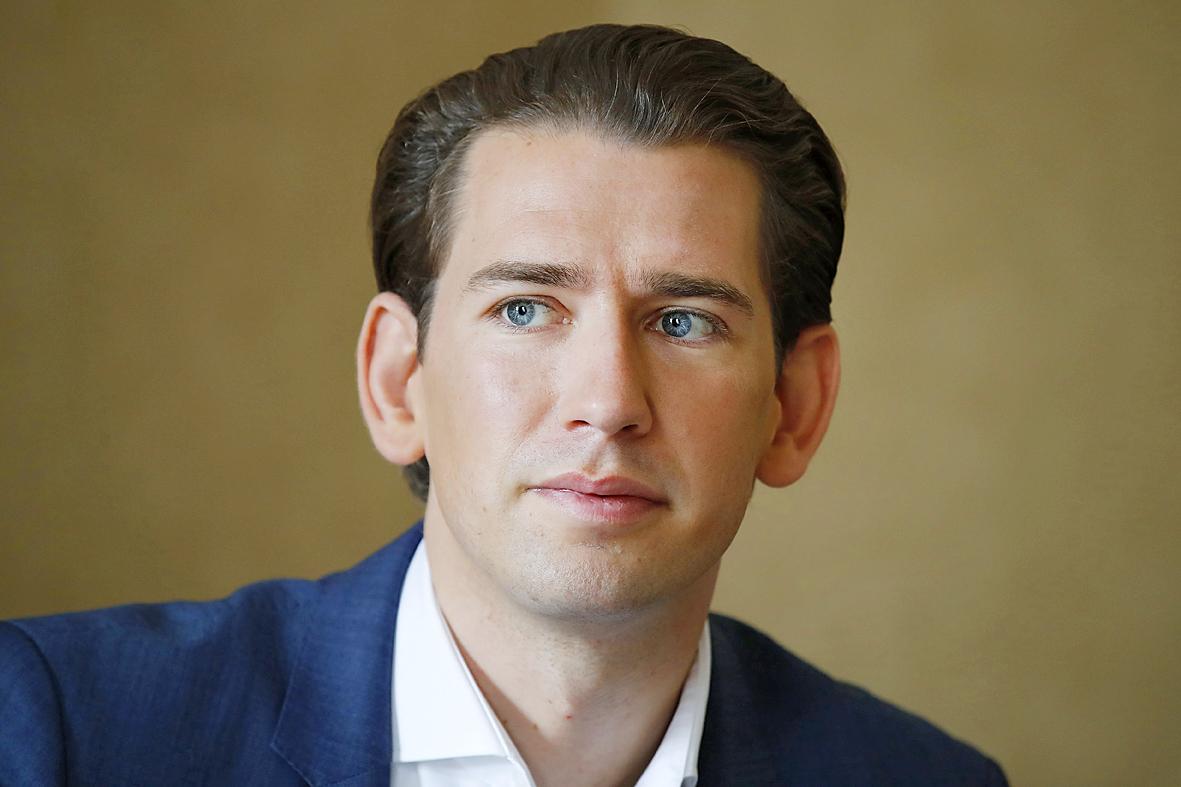Austrian Minister of Foreign Affairs Alexander Schallenberg was yesterday expected to take over the chancellorship, a day after Sebastian Kurz announced he would step down amid graft claims, capping the spectacular rise of one of Europe’s youngest political leaders.
The 35-year-old conservative late on Saturday announced that he was stepping down as chancellor, bowing to pressure to resign after he was implicated in a corruption scandal.
Saying he wanted to “make space to prevent chaos,” Kurz — who has headed two governments over the past four years — has suggested foreign minister Schallenberg to take over the chancellery.

Photo: Bloomberg
The 52-year-old diplomat was to meet Austrian President Alexander Van der Bellen yesterday following a meeting with Austrian Vice Chancellor Werner Kogler of the Greens.
Schallenberg has yet to speak publicly, but Kogler said late on Saturday that his party would support him to keep the conservative-Greens coalition in government.
Pressure on Kurz to resign, including from the Greens, started after prosecutors on Wednesday raided several locations linked to his People’s Party (OeVP).
They announced that Kurz and nine other people were under investigation over claims that government money was used between 2016 and 2018 in a corrupt deal to ensure positive media coverage.
Kurz has denied any wrongdoing, reiterating on Saturday that allegations against him were “false,” and that he would seek to clear up the matter while he continues as party leader and as a lawmaker in parliament.
The opposition has blasted the continued conservative-Greens coalition given the graft investigation, with Social Democrats leader Pamela Rendi-Wagner saying even on the back benches Kurz would remain a “shadow chancellor.”
“There is no doubt that he [Kurz] assumes that he will be able to pull the strings from the not-so-subtle background,” wrote Hans Rauscher, a columnist for the left-leaning Der Standard, dubbing Kurz “tricky Sebastian.”

The US government has signed defense cooperation agreements with Japan and the Philippines to boost the deterrence capabilities of countries in the first island chain, a report by the National Security Bureau (NSB) showed. The main countries on the first island chain include the two nations and Taiwan. The bureau is to present the report at a meeting of the legislature’s Foreign Affairs and National Defense Committee tomorrow. The US military has deployed Typhon missile systems to Japan’s Yamaguchi Prefecture and Zambales province in the Philippines during their joint military exercises. It has also installed NMESIS anti-ship systems in Japan’s Okinawa

TRAGEDY STRIKES TAIPEI: The suspect died after falling off a building after he threw smoke grenades into Taipei Main Station and went on a killing spree in Zhongshan A 27-year-old suspect allegedly threw smoke grenades in Taipei Main Station and then proceeded to Zhongshan MRT Station in a random killing spree that resulted in the death of the suspect and two other civilians, and seven injured, including one in critical condition, as of press time last night. The suspect, identified as a man surnamed Chang Wen (張文), allegedly began the attack at Taipei Main Station, the Taipei Fire Department said, adding that it received a report at 5:24pm that smoke grenades had been thrown in the station. One man in his 50s was rushed to hospital after a cardiac arrest

‘WIN-WIN’: The Philippines, and central and eastern European countries are important potential drone cooperation partners, Minister of Foreign Affairs Lin Chia-lung said Minister of Foreign Affairs Lin Chia-lung (林佳龍) in an interview published yesterday confirmed that there are joint ventures between Taiwan and Poland in the drone industry. Lin made the remark in an exclusive interview with the Chinese-language Liberty Times (the Taipei Times’ sister paper). The government-backed Taiwan Excellence Drone International Business Opportunities Alliance and the Polish Chamber of Unmanned Systems on Wednesday last week signed a memorandum of understanding in Poland to develop a “non-China” supply chain for drones and work together on key technologies. Asked if Taiwan prioritized Poland among central and eastern European countries in drone collaboration, Lin

ON ALERT: Taiwan’s partners would issue warnings if China attempted to use Interpol to target Taiwanese, and the global body has mechanisms to prevent it, an official said China has stationed two to four people specializing in Taiwan affairs at its embassies in several democratic countries to monitor and harass Taiwanese, actions that the host nations would not tolerate, National Security Bureau (NSB) Director-General Tsai Ming-yen (蔡明彥) said yesterday. Tsai made the comments at a meeting of the legislature’s Foreign Affairs and National Defense Committee, which asked him and Minister of National Defense Wellington Koo (顧立雄) to report on potential conflicts in the Taiwan Strait and military preparedness. Democratic Progressive Party (DPP) Legislator Michelle Lin (林楚茵) expressed concern that Beijing has posted personnel from China’s Taiwan Affairs Office to its